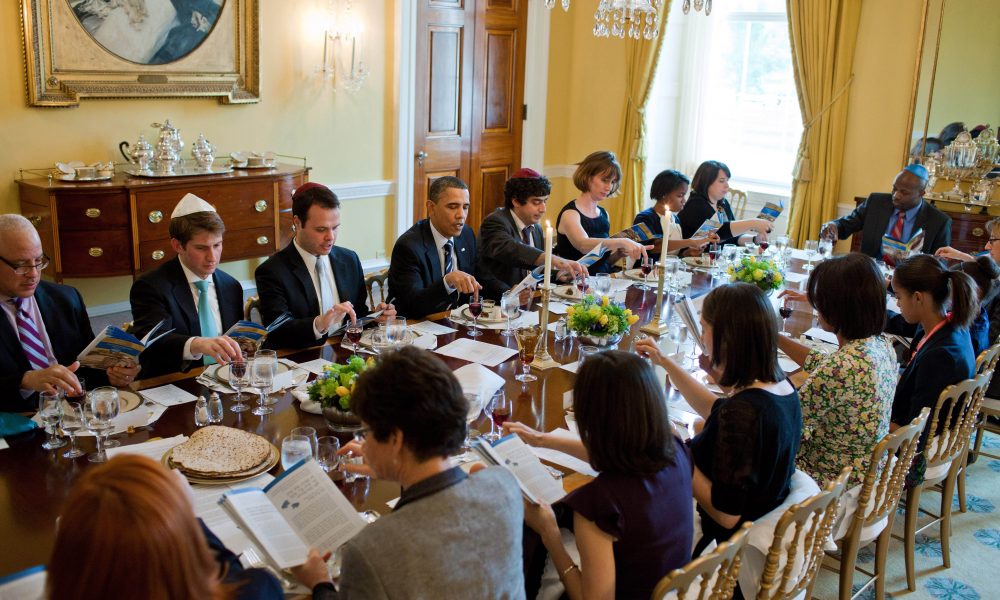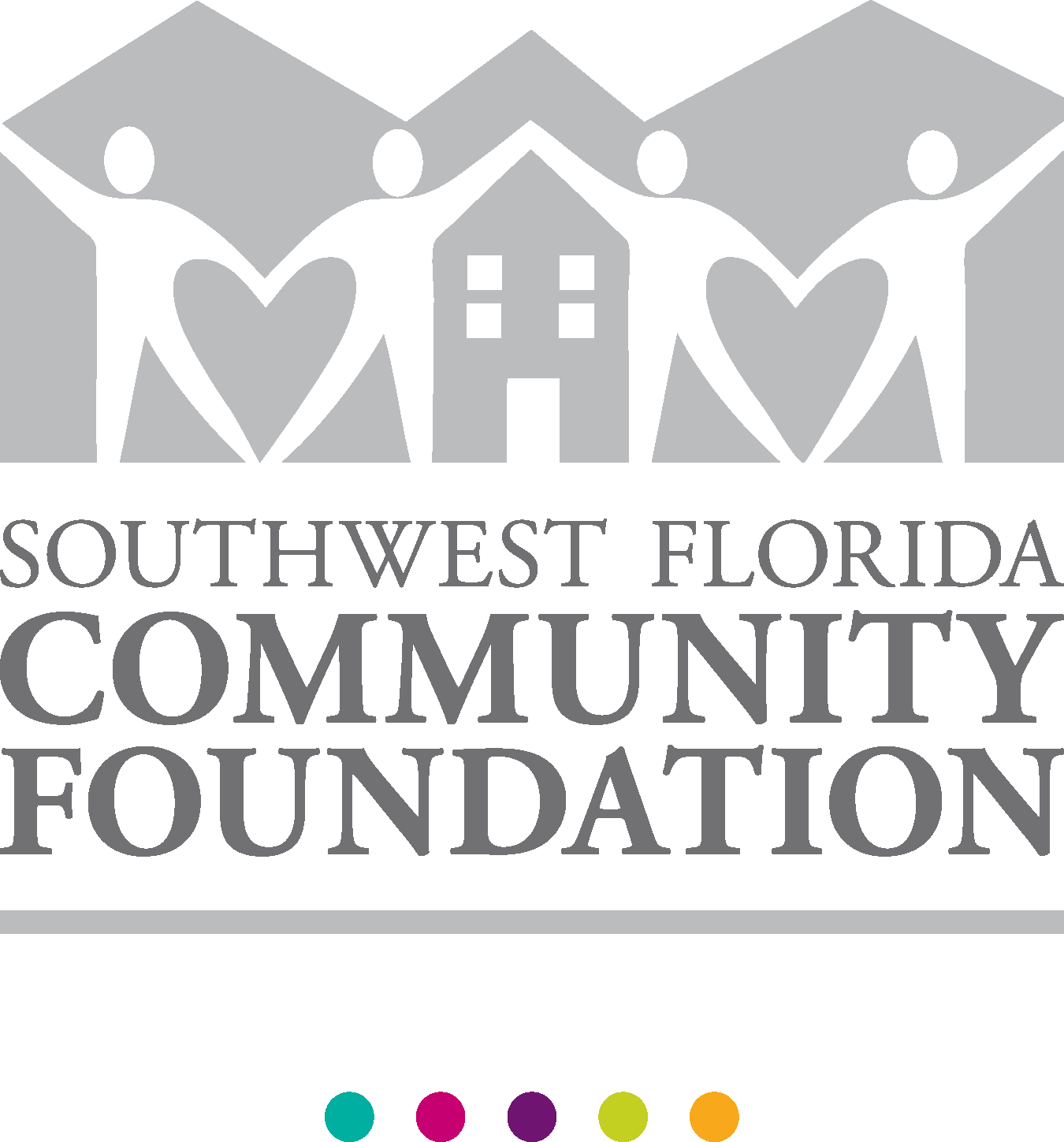I’ve been feeling a little weepy this Passover, awash in memories of the epic Seders of my orthodox Jewish childhood. They were epic, not just in the number of people participating, nor in the abundance of wonderful, traditional dishes, but especially in the learning, the discussion, the debating, and the inclusion in all of that of the always questioning child that I was.
It was in the Passover Haggadah, in the retelling of how we were freed from slavery in Egypt, that I learned about the foundations of Jewish commitment to social justice and caring for the strangers in our midst. We are commanded in the Passover service to view that original Exodus, not as a historical incident in which our ancestors were freed, but as something which was happening to every one of us. Somewhere we have pictures of those Seders, but this picture of the Obama family’s White House Seder, Haggadahs in hand, always makes me smile, so I’ve included it instead.
All of my Dad’s siblings, their spouses and children were there, for starters, plus there were other family and friends who came and went from the guest list as the Blooms ensured that no one in our extended family was ever without a Seder to attend. The adults gathered around the beautifully set dining room table (no where near as grand as the White House one in this picture) while my first cousins, my sister and I sat at an improvised and far less elegant “children’s table” through the open arch in the living room. One of the highlights of my young life was graduating from the children’s table to join the adults seated around the dining room table. But I’m getting ahead of my story.
The matriarch of our family, Bubbi Bloom of blessed memory, and her husband Meyer Bloom, the grandfather I never knew because he had died before I was born, fled the Czar’s pogroms and forced conscription at the start of the 20th century. Along with many others from their shtetl near Vilnius, in what is now Lithuania but was then the Russian Pale, their destination was America, Der Goldene Medina, literally the place with streets of gold but understood to be the land of opportunity (here’s one well-researched story which parallels that of my own family https://www.jewishgen.org/Bessarabia/files/Emigration/JourneyFromEasternEuropeToNorthAmerica1900-1904.pdf). One of my retirement dreams is to trace our family’s life before their own Exodus, and I so wish that I had interviewed everyone at those early Passover Seders about which ghettos they and their immediate ancestors had lived in, about all of the family members and life event dates they would remember, and about every other detail of their lives before arriving in Der Goldenen Medina while those who had lived it were still with us. But I didn’t know then how much it would matter to me now. And because we Jews have been on the run for millenia, refugees from one “Czar” after another, lucky to get out and traveling light, genealogical records for poor Jewish families like ours are really thin.
In that time, wealthy Jewish families, very notably the Rothchilds, helped Jews fleeing the Czar to settle, primarily as kibbutznicks (and there are a number in our family) in what was then Palestine, but most were headed to the UK, Canada, South Africa (where lived a surprisingly large number of Lithuanian Jews) and, of course, the United States. By train, donkey cart, and on foot, by whatever means were available to poor, hungry refugees, who spoke only Yiddish and a little Russian, my family and so many more came not only with the clothes on their backs and their little bundles but also with their knowledge (e.g. hundreds of years of Jewish history, tradition, and prayers) and skills (e.g. the recipes which Bubbi prepared without anything in writing or any measurements and the umbrella fixing which was the start of our family’s business). When I asked about those amazing recipes that only existed in her mind and hands, Bubbi always said that our most valuable possessions were the knowledge in our minds and the skills in our hands, none of which could be stolen from us as we ran from the Cossacks. And none of those wonderful recipes tasted better than when eaten after what seemed like the longest possible but oh so traditional Pesach service.
Many days in advance of Pesach, the preparations began. The women in my family cleansed their homes completely, ridding them of chametz, of foods which were not kosher for Passover, and doing what many would call spring cleaning. Any chametz which might be useful to others was given away to gentile neighbors or to a local charity, all of the year-around kitchen items (dishes, flatware, pots and pans, everything) were put away, counters were covered to prevent any remaining chametz from escaping, and then out came all the same sorts of items used only once a year for the eight days of Pesach. You can’t even imagine how many sets of everything it takes to outfit a kosher home for the rest of the year and then double that for Pesach: everyday dishes and flatware for milchig and fleishig plus the same for special occasions (so four sets of all tableware for all of the year except Passover) and all four again for Passover (so eight sets of all tableware and flatware to cover the entire year. Keeping kosher wasn’t easy, convenient or cheap, but we wouldn’t have considered doing anything else.
Once the kitchens were prepared, and the Pesach orders placed with the kosher butcher, grocer, and more, Seder preparations began in earnest. While I’ve never had any interest in cooking, I loved sitting in Bubbi Bloom’s kitchen, reading (I always had my nose in a book) but helping when asked, listening to the women gossiping away in the Yiddish they thought we children didn’t understand. Yiddish was the lingua franca of my childhood and its sound, to this day, fills my eyes with tears for a lost way of life. Many years later, when I began to travel, those remembered Yiddish words and phrases have provided entrée in so many places. While I couldn’t speak Hungarian or Bulgarian or Italian or Portuguese, when we toured the Jewish heritage of these countries I could always find a Yiddish-speaking elder with whom to establish a bond. The language of the ghetto was once a thriving part of American Jewish culture, with Yiddish newspapers and books, Yiddish theater and radio, and so much more. After nearly dying out, there’s a massive rescue operation underway by The Yiddish Book Center.
All Jewish holidays start the evening before, so for that first Seder, the men would have gathered for afternoon prayers and then come directly to Bubbi Bloom’s to start the Seder right on the dot. It would be hours before we ate because these Seders, led mostly by my father’s two brothers, not only retold the story of that original Exodus, of the Jews emergence as a people from their slavery in Egypt, but also of our own family’s escape from Europe and overcoming of the challenges they faced as immigrants. At Bubbi’s Passover table, we discussed not only the contents of the Haggadah but also every conceivable topic in Jewish history, philosophy, and culture as well as current events, politics and the family business. We talked, we disagreed, we argued, we debated, and my child’s voice was as welcome as an adult’s. When you grow up this way, turning an issue this way and that, examining it from every angle, and having to express your views concisely and persuasively, you are learning how to apply the Talmudic method to all of life’s challenges. It was only decades later that I realized that I had been learning critical thinking skills along with my matzo ball soup.
In a very real way, our Seder service, when all Jews are commanded to relive that Exodus as though it were happening now and to each person at the Seder table, was not only the story of our family but also of every refugee family. If Bubbi and the grandfather I never knew hadn’t escaped their shtetl and found refuge in America, I wouldn’t be here to write this Passover memory. If the Czar’s pogroms didn’t get us, the Nazis would have. We too were refugees seeking asylum in America, as had so many before us and since. I am the product of that history, with a deep attachment to the country which took us in and in which I’ve had incredible opportunities. This is why I will never understand — NEVER — how any Jew can behave as Presidential aide Stephen Miller behave or accept this behavior in others as Jared Kushner has done. How dare these men, who owe their very lives to their ancestors finding refuge in America (not always a welcoming America, especially not to Jews and other minorities, but that’s another tale), denigrate the poor, frightened refugees and asylum seekers finding their way to our borders? We have plenty of room in America for talented, hard working, refugees whose knowledge and skills may travel light but which cannot be stolen from them at our borders.
Wishing you and yours a Happy Passover (for which I’m well within that holiday’s window) to my Jewish friends and colleagues and a slightly belated Easter to my Christian ones.







Leave a Reply
You must be logged in to post a comment.